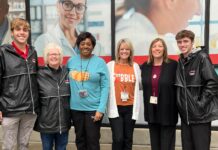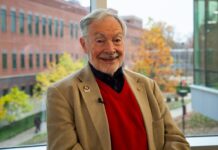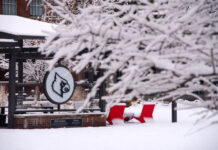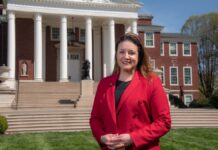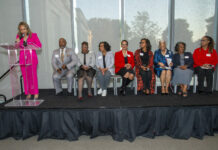Schapmire’s scholarship won her two $40,000 grants from the American Cancer Society to study the needs of people who have repeated cycles of cancer diagnosis, treatment and remission. An oncology social worker since 1996 who practiced inpatient and outpatient medical social work at a Louisville hospital until 2007, she is a leader in her field and serves on the national board of directors of the Association of Oncology Social Work and the American Clinical Social Work Association/American Board of Examiners in Clinical Social Work. And she still works with cancer patients. She co-facilitates support groups that receive funding from Susan G. Komen for the Cure, in collaboration with Gilda’s Club, Louisville, and she is a psychosocial facilitator for the annual Casting for Recovery Retreats for women with breast cancer.
UofL Today caught up with her recently. Here’s what she had to say:
What led you to the field of oncology social work?
I was meant to be an oncology social worker — I found my life’s calling in this field. I was interested in the medical field at a young age and I was also very interested in fairness, justice, advocacy and the psychosocial aspects of illness. When I learned a career existed that would allow me to combine these interests, I went after it—and I never looked back.
You earned your master’s degree in social work from UofL and worked in the field of oncology social work for over a decade. What brought you back to UofL for a PhD?
I loved practicing social work; I loved working with patients and families and working with interdisciplinary teams to build psychosocial oncology programs and services. I had also been serving as practicum supervisor for Kent School of Social Work MSSW students for years, and had always been interested in what was happening on the academic side of social work. Then, when the Kent School decided to build the nation’s first endowed chair in oncology social work, I became convinced that the timing was right for me to be involved in something really wonderful for my profession, for the Kent School and for the University of Louisville. The assistantships and tuition awards offered by the university, the Kent School of Social Work, the School of Interdisciplinary and Graduate Studies and the School of Medicine’s Interdisciplinary Program for Palliative Care and Chronic Illness were vital to my success in the pursuit of my PhD.
What does it mean to you to receive the Guy Stevenson Award for Excellence in Graduate Studies and to represent all graduate students as commencement speaker?
I am humbled to be chosen among so many amazing scholars. I accept this honor with deepest gratitude for all those who helped me earn it.
What do you plan to say at commencement?
I plan to share a bit about what working with people affected by cancer has taught me about life — and how that applies to graduates.
What’s next for you?
I am joining the faculty of University of Louisville’s School of Medicine in the Department of Medicine as an assistant research professor. I will also continue to work with the Kent School to help build the oncology social work program. I am so very excited to have an opportunity to stay at UofL and work in the interdisciplinary field I love with people I admire, can learn from, and with whom I really enjoy working.
Is there anything else you’d like people to know?
I would encourage all new graduates to pursue your passions, all of them. I encourage you to find and honor your mission in life, and allow yourself to be driven by that mission. Then find great people who share your mission — find people to work with who inspire you, mentor you, and make you laugh. All great things will naturally follow.












